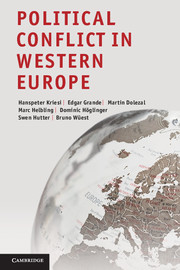Book contents
- Frontmatter
- Contents
- List of Figures
- List of Tables
- Preface and acknowledgments
- Part I Theory and methods
- Part II The development of the ‘integration–demarcation’ cleavage
- Part III Public debates: the articulation of the new cleavage in detail
- Part IV Conclusion
- 11 Conclusion: how much change can we observe and what does it mean?
- References
- Index
11 - Conclusion: how much change can we observe and what does it mean?
Published online by Cambridge University Press: 05 August 2012
- Frontmatter
- Contents
- List of Figures
- List of Tables
- Preface and acknowledgments
- Part I Theory and methods
- Part II The development of the ‘integration–demarcation’ cleavage
- Part III Public debates: the articulation of the new cleavage in detail
- Part IV Conclusion
- 11 Conclusion: how much change can we observe and what does it mean?
- References
- Index
Summary
The main argument: restructuring political conflict
West European politics is in flux. In the last five decades, it has been the object of two major waves of change. The first wave started in the 1960s and resulted in a profound transformation in political values, styles of political participation, and modes of political organization. Its manifestations include post-materialist values, an increase in unconventional political participation, new social movements, and Green parties. Although these developments have not been the explicit objects of study in this book, their continuing relevance has been clearly demonstrated in several chapters. In the electoral arena, the cultural dimension of political conflict is very much determined by new issues of cultural liberalism (see Chapter 4), the protest arena is still dominated by the issues and actors created by the first transformation (see Chapter 6), and Green parties certainly contribute to the fragmentation and polarization of West European party systems. These changes have been treated extensively in the scholarly literature, and there is a wealth of empirical evidence as to their relevance and transformative power (Dalton et al. 1984; Flanagan 1987; Inglehart 1977, 1990; Inglehart and Welzel 2005; Kriesi 1993).
The rise of ‘new politics’ is only part of the story, however. For a full understanding of the restructuring of West European politics, we need to give special attention to a second wave of changes which has been either neglected or misinterpreted in the literature on new politics and value change. This second wave set in during the 1980s and was produced by completely different actors articulating markedly different issues (Kriesi 1999). A new type of radical populist right, mobilizing against immigration and European integration, has been the driving force of this second transformation of West European politics, as the analyses in the current book show.
- Type
- Chapter
- Information
- Political Conflict in Western Europe , pp. 277 - 301Publisher: Cambridge University PressPrint publication year: 2012
- 6
- Cited by



